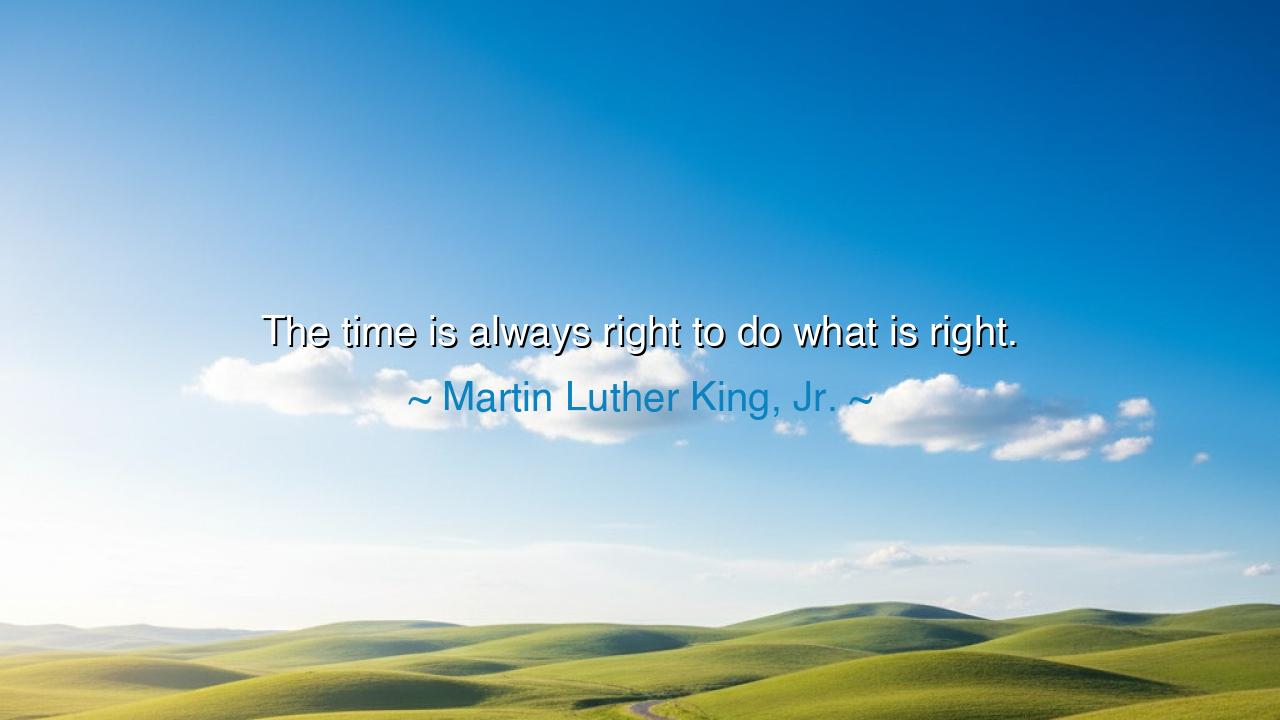
The time is always right to do what is right.






The words of Martin Luther King, Jr., spoken with the force of a prophet, resound across generations: “The time is always right to do what is right.” In this brief but thunderous phrase, King cuts through hesitation, fear, and excuse. He reminds humanity that justice does not wait for convenience, nor does righteousness bow to timing. To do what is right is an eternal command, and the moment to act is not tomorrow, not when it feels safe, but now.
The meaning is both simple and profound. Too often men excuse their inaction by saying, “The time is not yet.” They wait for better conditions, for more support, for greater courage. Yet King knew that such waiting only strengthens the chains of injustice. The right time is not a season granted by fate—it is forged by the courage of those who choose to stand for truth in the present. By his words, he demands that we abandon delay and recognize that the call of righteousness is immediate.
The origin of this wisdom is rooted in King’s own life as a leader of the Civil Rights Movement. He spoke these words during a time when African Americans endured segregation, humiliation, and violence. Many counseled patience, urging him to wait until society was ready for change. But King understood that waiting for justice is itself a form of injustice, for each day of delay meant more suffering, more wounds, more souls denied their dignity. His call was a trumpet blast against complacency: justice delayed is justice denied.
History illustrates his truth in countless ways. Consider the abolitionists of the 19th century. Many argued that slavery would fade away “in time,” if only people would wait. But the enslaved could not wait—their lives were consumed in chains while others debated the proper season for action. It was those who refused to wait, who declared that the time was always right to do what is right, that ultimately broke the bonds of slavery and pushed the world closer to justice.
The deeper teaching is that morality is not bound by circumstance. It does not bend to politics, to fear, or to the slow turning of society’s gears. The call to do what is right stands outside of time, eternal and unchanging. When we postpone righteousness, we ally ourselves with wrong; when we act with courage, we align ourselves with truth. King’s words urge us to stand in the eternal now, where justice demands action, not excuses.
The lesson for you, seeker, is to cast aside hesitation when confronted with injustice or moral choice. Do not tell yourself that tomorrow will be easier or safer. The test of your character is not whether you know what is right, but whether you will act on it now. Even small deeds—a word spoken in defense, a kindness given to the oppressed, a refusal to compromise with evil—become mighty when done in the present moment.
Practical actions follow. When you see wrongdoing, speak against it immediately, even if your voice trembles. When you are faced with an opportunity to show compassion, do not postpone it for another day. If you are tempted to wait for a more convenient season, remember King’s words: there is no better time. Begin with the small steps in your own circle, and let them ripple outward to the world. For righteousness grows when it is acted upon, but withers when delayed.
So remember, children of tomorrow: the time is always right to do what is right. Do not be lulled by waiting, nor deceived by fear. The power to shape justice lies in the courage of the present moment. Seize it, live it, and let your actions be the light that breaks through the darkness. For eternity itself honors those who chose to act when others chose to wait.






AAdministratorAdministrator
Welcome, honored guests. Please leave a comment, we will respond soon